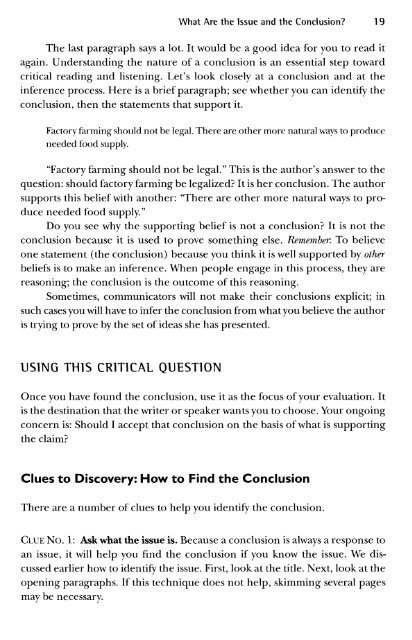Asking the Right Questions, A Guide to Critical Thinking, 8th Ed
Asking the Right Questions, A Guide to Critical Thinking, 8th Ed
Asking the Right Questions, A Guide to Critical Thinking, 8th Ed
Create successful ePaper yourself
Turn your PDF publications into a flip-book with our unique Google optimized e-Paper software.
What Are <strong>the</strong> Issue and <strong>the</strong> Conclusion? 19<br />
The last paragraph says a lot. It would be a good idea for you <strong>to</strong> read it<br />
again. Understanding <strong>the</strong> nature of a conclusion is an essential step <strong>to</strong>ward<br />
critical reading and listening. Let's look closely at a conclusion and at <strong>the</strong><br />
inference process. Here is a brief paragraph; see whe<strong>the</strong>r you can identify <strong>the</strong><br />
conclusion, <strong>the</strong>n <strong>the</strong> statements that support it.<br />
Fac<strong>to</strong>ry farming should not be legal. There are o<strong>the</strong>r more natural ways <strong>to</strong> produce<br />
needed food supply.<br />
"Fac<strong>to</strong>ry farming should not be legal." This is <strong>the</strong> author's answer <strong>to</strong> <strong>the</strong><br />
question: should fac<strong>to</strong>ry farming be legalized? It is her conclusion. The author<br />
supports this belief with ano<strong>the</strong>r: "There are o<strong>the</strong>r more natural ways <strong>to</strong> produce<br />
needed food supply."<br />
Do you see why <strong>the</strong> supporting belief is not a conclusion? It is not <strong>the</strong><br />
conclusion because it is used <strong>to</strong> prove something else. Remember. To believe<br />
one statement (<strong>the</strong> conclusion) because you think it is well supported by o<strong>the</strong>r<br />
beliefs is <strong>to</strong> make an inference. When people engage in this process, <strong>the</strong>y are<br />
reasoning; <strong>the</strong> conclusion is <strong>the</strong> outcome of this reasoning.<br />
Sometimes, communica<strong>to</strong>rs will not make <strong>the</strong>ir conclusions explicit; in<br />
such cases you will have <strong>to</strong> infer <strong>the</strong> conclusion from what you believe <strong>the</strong> author<br />
is trying <strong>to</strong> prove by <strong>the</strong> set of ideas she has presented.<br />
USING THIS CRITICAL QUESTION<br />
Once you have found <strong>the</strong> conclusion, use it as <strong>the</strong> focus of your evaluation. It<br />
is <strong>the</strong> destination that <strong>the</strong> writer or speaker wants you <strong>to</strong> choose. Your ongoing<br />
concern is: Should I accept that conclusion on <strong>the</strong> basis of what is supporting<br />
<strong>the</strong> claim?<br />
Clues <strong>to</strong> Discovery: How <strong>to</strong> Find <strong>the</strong> Conclusion<br />
There are a number of clues <strong>to</strong> help you identify <strong>the</strong> conclusion.<br />
CLUE NO. 1: Ask what <strong>the</strong> issue is. Because a conclusion is always a response <strong>to</strong><br />
an issue, it will help you find <strong>the</strong> conclusion if you know <strong>the</strong> issue. We discussed<br />
earlier how <strong>to</strong> identify <strong>the</strong> issue. First, look at <strong>the</strong> title. Next, look at <strong>the</strong><br />
opening paragraphs. If this technique does not help, skimming several pages<br />
may be necessary.



